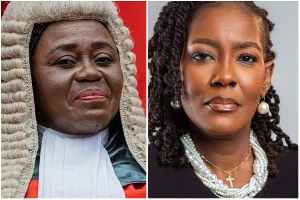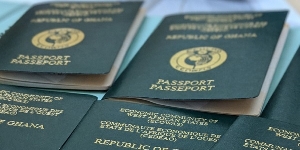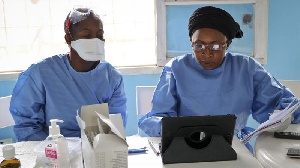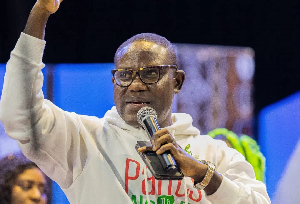..... their Unnecessary Interference in the work of the EC
By Ken N. Johnson
Is it right for the civil societies and the clergy to direct the Electoral Commission how to manage its business? NO! Is it right for the civil societies and the clergy to speak on constitutional issues? YES! Every true believer of democracy believes in the constitution as the “righteous” book to govern. Although under democracy, the right to express oneself is idyllically allowed, it is also perhaps good to manage unnecessary side shows.
In recent times, we have seen how some sections of the civil societies and the clergy have added their voices into the debates on the creation of additional 45 new constituencies earmarked for the 2013 parliamentary term. While such reactions so far have been good, however, they have largely been attributed to insincerity.
Although in principle, all the political parties in Ghana agree that the existing constituency demarcation desperately require to be redrawn to satisfy constitutional requirements and true representation of our people in parliament. The truth is that, beginning 2012, the Electoral Commission of Ghana made it known that it shall carry out the changes before the next parliamentary term begins in 2013. Ghanaians were made aware of the possible increases in parliamentary seats to reflect current trend and also to enhance proper managements of the decentralisation process.
It is not my strong desire to make partisan points, however since the idea of creating new constituencies has taken a major political colouring with the main opposition party particularly opposing the idea. One wonders if the other minority parties find anything wrong at all with the proposal put forward by the EC to get the people of GHANA better served in parliament. The answer is obviously, NO!
As a keen enthusiast of the subject, I am clear with the varied arguments put forward so far for and against the creation of the new 45 constituencies. Interestingly, such arguments put forward against the creation of the new constituencies, unfortunately have been a foggy thought process.
One is not able to align the cases put forward on any specific issues except for the fear of political disadvantage which does not reside in logic on the part of the critics of the system. The hopes and aspirations of citizens in yet to be created constituencies would be well enhanced if the politicking is distilled from the real reasons given by the EC to create new constituencies.
Boundary demarcation or delineations is not something new in Ghana’s democracy and as well as in well matured democracies. Under the previous NPP administration, Ghana’s parliamentary boundaries were reviewed which resulted in the 230 MP’s in parliament today. The very same formula as we are told by the EC has been used in drawing up the new constituency boundaries currently been challenged.
Supporters of the EC’s action, argue that, it is not in all cases that boundary demarcation results in the rise in number of MPs, hence the financial implications as originally argued by the main opposition party is flawed. Now, NPP’s position has changed considerably to what they perceive as time constraint to organise parliamentary selections. What the opponents have failed to accept is the constitutional requirement associated with the EC’s position. The 1992 constitution says “a constituency shall not span two districts” hence with the creation of new districts the EC must by law redraw the constituency boundaries to satisfy what is a constitutional requirement. Ghanaian voters became increasingly concerned when former president Kuffour decided to use the NPP’s campaign platform in Accra to speak on this matter by pleading with the EC to rescind their decision to create the new 45 constituencies. Former president Kuffour’s assertion of linking the EC’s intention to possibly causing disastrous damages to our existing peace enjoyed by Ghanaians was contemptuous.
Many are those who felt genuinely disappointed by Mr Kuffour’s statement. Perhaps, it suffices to say that Mr Kuffour endorses the “all die be die” mantra of his party! Indeed, Mr Kuffour being aware of the functions of the EC and having occupied the highest office in Ghana could have acted more as a true statesman by using the appropriate channel to voice his concerns, albeit contemptuous and not to join the bandwagon of politicking on the matter.
The behaviour of NPP functionaries and fanatics on this subject also makes Ghanaians wonder if the NPP as a party has no hidden agenda other than their wishy-washy reasons given. Such characters are being hypocritical with the democratic system.
Despite the desperate moves taken by known members of NPP to take EC to the high court on this issue, the party continues to use its machination to put unnecessary pressure on the EC. What has the NPP got to be afraid of, if the bill on the 45 constituencies gets the parliamentary approval to move our country's democratic process forward?
One would expect a coherent argument from a political party seeking the mandate of the good people of Ghana. On the contrary, all that Ghanaians hear time and time again is “we won’t cooperate with the system”. Is it not a mischief, these guys are looking for? Last week, we witnessed how the minority NPP MP’s walked out of parliament on a silly “argy-baggy” of CI serial numbering. Can our MPs show seriousness for once and use dialogue to resolve all differences in the chamber? I urge Parliament to form a quorum with or without NPP members to pass the bill as a matter of urgency.
Undeniably, it is alleged that, one of the many strategies put up by the NPP to stifle the process is using some civil societies and some clergy as conduits to pressurise the EC from doing its constitutional mandate. What strikes ones imagination is, these so called civil societies knew of the EC’s intention prior to June 2012, but, none of them spoke on the matter until now? Stopping the EC from doing what is right constitutionally will be very disingenuous which could cause grave catastrophe to the political process. One can only conclude that, some of the leadership of these organisations calling on the EC to halt the process have elements of parochial interest aiming to cause mischief.
This debate should be devoid of personality attacks and unnecessary insinuations. The attacks on the EC and its functionaries must cease. Obviously, with the exception of the NPP, all the other political parties have in principle agreed that, 45 new constituency’s makes economic, political and legal sense to start in the next parliamentary calendar which is in January 2013.
It is evident from the prevailing argument that the NPP has an issue with time and logistics to prepare candidates for these new constituencies, but this is no fault of the EC but rather the party’s faux pas. If the party is serious and wants to shift from playing the blame game, then they can easily achieve this exercise as the NDC has done.
In any case, the bill was first sent to parliament around June, 2012, but for the naked opportunism of the NPP, they decided to exploit avenues of suffocating the process in the high courts. It is known that, there are about 5 constituencies; the NPP has yet to make parliamentary selection for their members to represent the party in the existing 230 seats system.
It is known that, the NDC, CPP, PNC, PPP and all the other parties are ready to fill their candidates for the new constituencies; I will urge former president Kuffour to do what is right by asking the party he once led to begin their selection of parliamentary candidates for the new constituencies.
Civil societies and the clergy should stop interfering in the work of the EC and as a matter of urgency and ask the NPP to do what is right.
The NPP is noted for having the reputation as war mongers and trouble makers during each time Ghana prepares for election. This has not been helped by the unnecessary threats issued by its affiliates in recent days. The practice of beating war drums and craving for violence should be discouraged, because Ghanaians are interested in living with one another in peace. Ghanaians want Peace, and if it remains the desire of some to disrupt the peace by using electoral excuses then, that will be a shame and very unforgivable.
God bless Ghana, Long live our democracy, and Long live Ghana.
Opinions of Friday, 14 September 2012
Columnist: Johnson, K. N.














